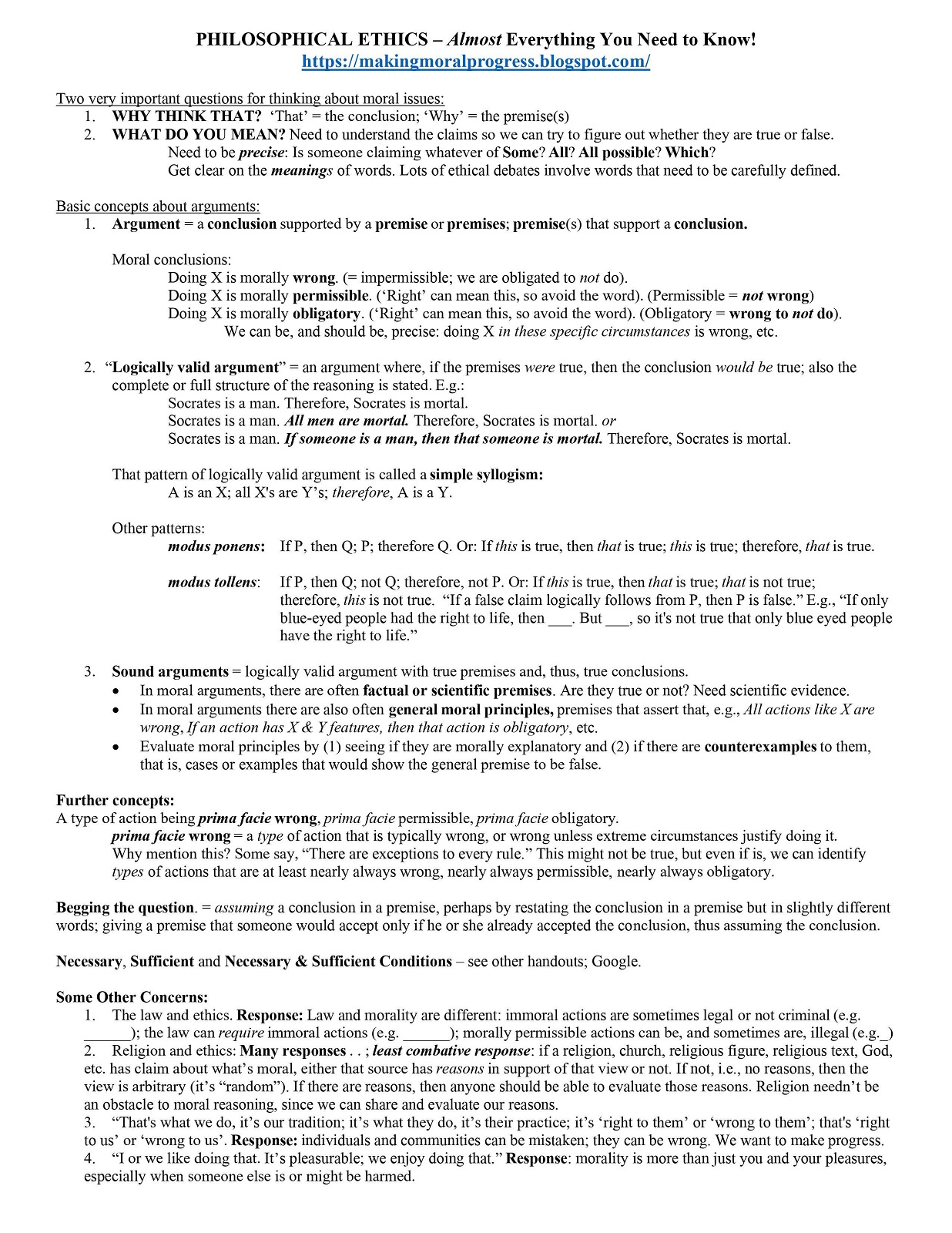PHILOSOPHICAL ETHICS – Almost Everything You Need to Know! https://makingmoralprogress.blogspot.com/
Two very important questions for thinking about moral issues:
1. WHY THINK THAT? ‘That’ = the conclusion;
‘Why’ = the premise(s)
2. WHAT DO YOU MEAN? Need to
understand the claims so we can try to figure out whether they are true or
false.
Need to be precise: Is someone claiming
whatever of Some? All? All possible? Which?
Get clear on the meanings of words. Lots of ethical debates involve words that need to be
carefully defined.
Basic concepts about arguments:
1. Argument = a conclusion supported by a premise or premises; premise(s)
that support a conclusion.
Moral
conclusions:
Doing X is morally
wrong. (= impermissible; we are
obligated to not do).
Doing X is
morally permissible. (‘Right’ can
mean this, so avoid the word). (Permissible = not wrong)
Doing X is
morally obligatory. (‘Right’ can
mean this, so avoid the word). (Obligatory = wrong to not do).
We can be, and
should be, precise: doing X in these
specific circumstances is wrong, etc.
2. “Logically valid argument” = an argument where, if the
premises were true, then the conclusion would be true; also the
complete or full structure of the reasoning is stated. E.g.:
Socrates is a man. Therefore, Socrates is mortal.
Socrates
is a man. All men are mortal. Therefore, Socrates is mortal. or
Socrates is a man. If someone is a man, then that someone is mortal. Therefore, Socrates is mortal.
That pattern of logically valid argument is
called a simple syllogism:
A is an X; all X's are Y’s; therefore, A is a Y.
Other patterns:
modus ponens: If P, then Q; P;
therefore Q. Or: If this is true, then that is true; this is
true; therefore, that is true.
modus tollens: If P, then Q; not Q; therefore, not P. Or: If this is true, then that is true; that is
not true; therefore, this is not true. “If a false claim logically follows from P, then P is false.” E.g.,
“If only blue-eyed people had the right to life, then ___. But ___, so it's not
true that only blue eyed people have the right to life.”
3. Sound arguments = logically valid argument with true premises and, thus, true
conclusions.
·
In moral
arguments, there are often factual or scientific premises. Are they true
or not? Need scientific evidence.
·
In moral
arguments there are also often general moral
principles, premises that assert that, e.g., All actions like X are
wrong, If an action has X & Y features, then that action is obligatory,
etc.
·
Evaluate moral
principles by (1) seeing if they are morally explanatory and (2) if there are counterexamples to
them, that is, cases or examples that would show the general premise to be
false.
Further concepts:
A type of action being prima facie wrong, prima
facie permissible, prima facie obligatory.
prima facie wrong = a type of action that
is typically wrong, or wrong unless extreme circumstances justify doing it.
Why mention this? Some say, “There are exceptions to every rule.”
This might not be true, but even if is, we can identify types of actions that are at least nearly always wrong, nearly
always permissible, nearly always obligatory.
Begging the question. = assuming a conclusion in a premise, perhaps
by restating the conclusion in a premise but in slightly different words;
giving a premise that someone would accept only if he or she already accepted
the conclusion, thus assuming the conclusion.
Necessary,
Sufficient and Necessary & Sufficient Conditions – see other handouts; Google.
Some Other Concerns:
1. The law and ethics. Response: Law and morality are
different: immoral actions are sometimes legal or not criminal (e.g. ______);
the law can require immoral actions (e.g. ______); morally permissible
actions can be, and sometimes are, illegal (e.g._)
2. Religion and ethics: Many responses . . ; least
combative response: if a religion, church, religious figure, religious
text, God, etc. has claim about what’s moral, either that source has reasons in
support of that view or not. If not, i.e., no reasons, then the view is
arbitrary (it’s “random”). If there are reasons, then anyone should be able to
evaluate those reasons. Religion needn’t be an obstacle to moral reasoning,
since we can share and evaluate our reasons.
3. “That's what we do, it’s our tradition; it’s what they do, it’s
their practice; it’s ‘right to them’ or ‘wrong to them’; that's ‘right to us’ or
‘wrong to us’. Response: individuals and communities can be mistaken;
they can be wrong. We want to make progress.
4. “I or we like doing that. It’s pleasurable; we enjoy doing that.” Response:
morality is more than just you and your pleasures, especially when someone else
is or might be harmed.

No comments:
New comments are not allowed.